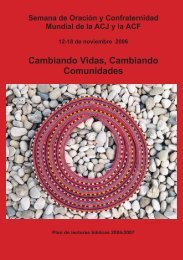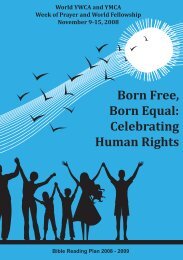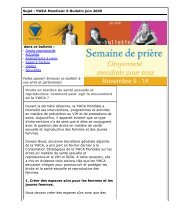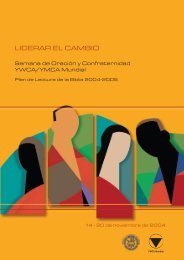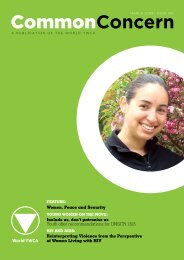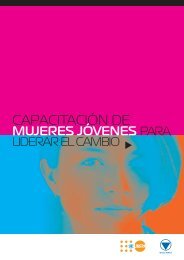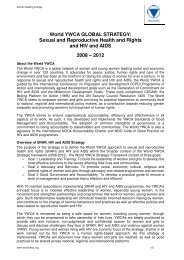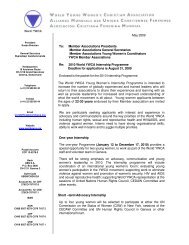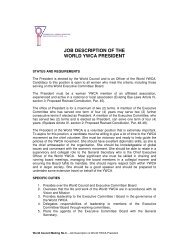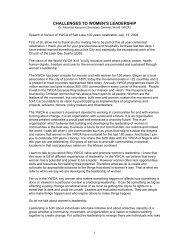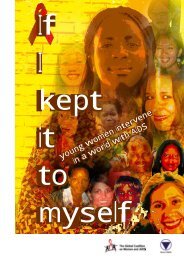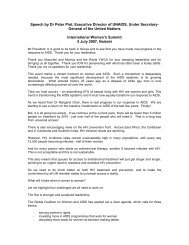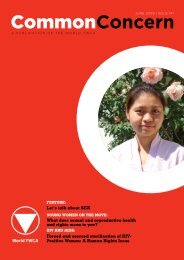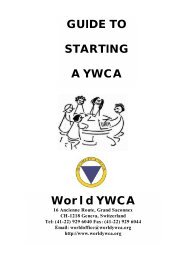Women - World YWCA
Women - World YWCA
Women - World YWCA
Create successful ePaper yourself
Turn your PDF publications into a flip-book with our unique Google optimized e-Paper software.
MARCH 2010 | ISSUE 143<br />
A P U B L I C A T I O N O F T H E W O R L D Y W C A<br />
feature:<br />
BEYOND BEIJING<br />
Young women on the move:<br />
Viewpoint: The most critical area of concern for<br />
young women for the next 15 years<br />
hiv and aids:<br />
Young People versus HIV and AIDS:<br />
A Comprehensive Approach
CC 2<br />
Contents<br />
03 | Editorial:<br />
Reigniting the Spirit of Beijing<br />
04 | <strong>YWCA</strong>s Around the <strong>World</strong><br />
Around the world <strong>YWCA</strong>s are showing that<br />
women and young women’s leadership<br />
can make all the difference in creating<br />
safe and secure communities.<br />
17 | The Beijing Platform for Action’s Impact<br />
on Kenyan Legislation and Beyond<br />
17 | Young women and empowerment:<br />
where to now?<br />
HIV and aids<br />
18<br />
Young <strong>Women</strong> versus HIV<br />
and AIDS: A Comprehensive<br />
Approach<br />
Feature<br />
6 beyond<br />
beijing:<br />
Then and Now - Recollections<br />
and Lessons from Beijing and Beyond<br />
When the Beijing Declaration and Platform for<br />
Action were adopted, the <strong>YWCA</strong> movement was<br />
there. 15 years later, we reflect on what this meant<br />
for the <strong>YWCA</strong> then and what it means to us now.<br />
08 | Accelerating <strong>Women</strong>’s<br />
Empowerment: Approaches for the<br />
next 15 years<br />
Take Action<br />
10 | Overcoming Barriers to Better<br />
Gender Representation in Politics<br />
11 | Holistic Policies Empower <strong>Women</strong><br />
Fleeing Violence<br />
Young <strong>Women</strong> on the Move<br />
13 | Viewpoint: The most critical area<br />
of concern for young women for the<br />
next 15 years<br />
Leading Change<br />
15 | Beijing +15: Views from around<br />
the movement<br />
Briefing<br />
20 | From the <strong>World</strong> <strong>YWCA</strong><br />
22 | People<br />
23 | Supporters<br />
President: Susan Brennan General Secretary: Nyaradzayi<br />
Gumbonzvanda Guest Editor: Muna Kaldawi-Killingback Coordinators:<br />
Sarah Davies, Sylvie Jacquat Distribution: Fiona<br />
Wilkie. Articles may be freely reproduced with acknowledgement<br />
to <strong>World</strong> <strong>YWCA</strong> Common Concern ISSN 1025-4099. ©2010 <strong>World</strong><br />
<strong>YWCA</strong>. All artwork, images and photography are protected by<br />
copyright and may not be reproduced without permission.<br />
Photo credits:<br />
Photo of Rebecca Anandi Smith by Pierre Michel Virot<br />
Common Concern is also published in French and Spanish.<br />
Contact worldoffice@worldywca.org to order.<br />
On the Cover:<br />
Paola Salwan, <strong>World</strong> <strong>YWCA</strong> Programme<br />
Assistant for Europe, Africa and the<br />
Middle East<br />
www.worldywca.org
CC <br />
Editorial<br />
Reigniting the<br />
Spirit of Beijing<br />
“Beijing was celebration, protest, discovery,<br />
dialogue, commitment and action”<br />
Susan Brennan<br />
<strong>World</strong> <strong>YWCA</strong> President<br />
Beijing, China 1995. I still<br />
remember the United<br />
Nations Fourth <strong>World</strong><br />
Conference on <strong>Women</strong>.<br />
More than a conference, Beijing<br />
was celebration, protest, discovery,<br />
dialogue, commitment and action.<br />
In Beijing, I encountered the <strong>YWCA</strong><br />
as a worldwide women’s movement,<br />
experienced the diversity of<br />
international feminism, confronted<br />
the controversy surrounding women’s<br />
sexual and reproductive health and<br />
rights, chanted “<strong>Women</strong>’s rights<br />
are human rights” with women from<br />
around the world, lobbied governments<br />
to recognise that violence against<br />
women is a human rights issue and<br />
witnessed women’s leadership on<br />
the global stage. For me, as a young<br />
woman representing the <strong>YWCA</strong> of<br />
Australia, Beijing was life-changing.<br />
Fifteen years later, the Beijing<br />
Platform for Action still charts the<br />
main route to women’s empowerment<br />
worldwide. It is a road map that has<br />
guided the work of <strong>YWCA</strong>s around the<br />
globe. As we participate in the 54th<br />
Commission on the Status of <strong>Women</strong><br />
where the international community<br />
will assess its progress implementing<br />
the Platform, the <strong>YWCA</strong> delegation<br />
will advocate for new pathways on<br />
women and health, specifically sexual<br />
and reproductive health and HIV<br />
and AIDS; violence against women<br />
and women in power and decisionmaking.<br />
The <strong>World</strong> <strong>YWCA</strong> will call<br />
on the international community to<br />
accelerate towards our destination of<br />
women’s empowerment.<br />
In this edition of Common<br />
Concern, three former <strong>World</strong><br />
<strong>YWCA</strong> leaders reflect on how the<br />
<strong>World</strong> <strong>YWCA</strong> both influenced and<br />
was impacted by the Fourth <strong>World</strong><br />
Conference on <strong>Women</strong>. <strong>World</strong> <strong>YWCA</strong><br />
General Secretary Nyaradzayi<br />
Gumbonzvanda offers directions<br />
to achieve equality, development<br />
and peace before the next 15-year<br />
milestone.<br />
We are honoured to have Special<br />
Adviser to the UN Secretary-General<br />
and Special Envoy for HIV and AIDS<br />
in Asia, Dr. Nafis Sadik outline future<br />
interventions needed by governments<br />
and civil society to ensure universal<br />
access, especially for women and<br />
young women, in our HIV and AIDS<br />
section.<br />
This issue highlights the work of<br />
<strong>YWCA</strong>s following the Beijing Platform<br />
for Action to achieve women’s<br />
empowerment, including the <strong>YWCA</strong><br />
of Guyana’s work in education,<br />
the <strong>YWCA</strong> of Liberia’s dynamic<br />
programme for former women soldiers<br />
and the initiative of the <strong>YWCA</strong> of Korea<br />
to economically and socially empower<br />
married migrant women.<br />
In Take Action, <strong>World</strong> <strong>YWCA</strong><br />
Board member and Deputy Mayor of<br />
Tampere, Finland Ana Kaisa Ikonen<br />
writes frankly about overcoming<br />
obstacles to women’s participation in<br />
politics and <strong>YWCA</strong> Canada shares<br />
its ”Beyond Shelter” programme and<br />
the essential changes in public policy<br />
required to ensure women are free<br />
from violence.<br />
Honouring our distinctive<br />
intergenerational approach, in the<br />
Leading Change section, <strong>YWCA</strong><br />
women leaders of all ages speak<br />
out about what they see as the most<br />
urgent issues in the Beijing Platform<br />
for Action, what has been achieved,<br />
and what still needs to be done. In<br />
Young <strong>Women</strong> on the Move, younger<br />
<strong>YWCA</strong> leaders share their critical<br />
concern for young women in the<br />
coming 15 years.<br />
It is vital that the international<br />
community recapture the spirit of<br />
optimism, which energised the mass<br />
gathering at Beijing in 1995. Together<br />
we must grasp the life-changing<br />
possibility that the empowerment of<br />
women around the world is within our<br />
reach, just around the next corner. •<br />
www.worldywca.org
CC <br />
<strong>YWCA</strong>s Around<br />
the <strong>World</strong><br />
2010 marks the 15th anniversary of the Beijing <strong>World</strong> Conference on<br />
<strong>Women</strong>. The fourth in a series of <strong>World</strong> Conferences for <strong>Women</strong>, the<br />
conference defined a clear direction for women’s advancement by adopting<br />
the Beijing Platform for Action (BPFA) and many <strong>YWCA</strong>s have since worked<br />
to promote the BPFA in their communities.<br />
<strong>YWCA</strong> of Liberia combines psychosocial<br />
counselling with vocational training<br />
for ex-soldiers<br />
programme’s health components included HIV and AIDS<br />
prevention and treatment. A total of 48 young women and<br />
girls in the programme were HIV positive.<br />
The <strong>YWCA</strong> concentrated its work in six counties that<br />
have high numbers of girls out of school as well as suitable<br />
commercial activities. These were Nimba, Bong, Bomi,<br />
Montserrado, Grand Bassa, and Margibi. Vocational skills<br />
choices included auto mechanics, brakes making, pastry<br />
making, and agro-processing. The programme was funded<br />
by the United Nations Development Programme.<br />
<strong>YWCA</strong> of Guyana Makes Girls Education<br />
a Priority<br />
The Platform for Action listed Armed Conflict as a ‘Critical Area of Concern’.<br />
The <strong>YWCA</strong> of Liberia provides safe spaces for women and girls associated<br />
with fighting forces.<br />
During the armed conflicts in Liberia, women<br />
and children were the most marginalised and<br />
vulnerable to domestic and sexual abuses,<br />
violence and torture. Some were even kept as<br />
sex slaves. The <strong>YWCA</strong> of Liberia’s vocational skills training<br />
programme integrates psychosocial counselling to help<br />
rehabilitate these girls and aid their reintegration back into<br />
their various communities.<br />
Between 2006-2009, the <strong>YWCA</strong> trained 525 war affected<br />
younger women and girls associated with fighting forces: 277<br />
were young women or girls, 200 were adult women.<br />
In interacting with these girls, the <strong>YWCA</strong> counsellors<br />
were able to get firsthand information about their<br />
experiences. To increase their gender sensitivity and<br />
facilitate reintegration upon return to their communities, men<br />
and boys were also included in the programme.<br />
As well as sports and other recreational activities, the<br />
www.worldywca.org<br />
With over 60 years of achievement in<br />
providing girls with vocational training, the<br />
<strong>YWCA</strong> has demonstrated the power of the<br />
old adage that when you educate a girl, you<br />
educate a nation.<br />
The <strong>YWCA</strong> of Guyana’s programme to educate girls<br />
has not only helped the girls to gain productive skills, it has<br />
contributed to poverty reduction and placed the issue back<br />
onto the government agenda.<br />
The <strong>YWCA</strong> of Guyana ensures education for women and girls is<br />
kept on the agenda
<strong>YWCA</strong>s Around the <strong>World</strong><br />
CC <br />
The <strong>YWCA</strong> of Korea offers migrant women financial education and<br />
vocational training to build better lives and stronger communities.<br />
<strong>YWCA</strong> of Guyana General Secretary Glynis Alonzo-<br />
Beaton explains: “It’s important we address the issue of<br />
women and education in Guyana as over the years women<br />
and girls were never on the agenda of those in authority.<br />
With the <strong>YWCA</strong> constantly keeping education a priority, it<br />
slowly caught on and crept back on the agenda of those in<br />
decision–making positions.”<br />
Offered to girls 14 to 18 years old who dropped out of<br />
the traditional education system, the two-year programme<br />
provides an opportunity to learn skills and gain economic<br />
independence. Over 70 students participate annually, usually<br />
in rural areas and the course has included HIV positive girls.<br />
The programme has had an “amazing impact” on the<br />
lives of young women participants and has “changed many<br />
lives.” Alonzo-Beaton says that, “More than 95% of young<br />
women who completed the course have gained a skill and<br />
become productive. If they did not have this opportunity,<br />
they would have remained uneducated and unemployed,<br />
increasing the poverty in Guyana.”<br />
The training includes design, entry-level administration,<br />
cosmetology, plumbing, dancing and life skills with sexual<br />
and reproductive health education and physical education.<br />
<strong>YWCA</strong> of Korea: Job Training Helps<br />
Migrant <strong>Women</strong> Build New Lives<br />
Single women who migrate to Korea generally<br />
come for employment opportunities. However,<br />
married women are often “trailing spouses”<br />
following their husband’s career path. They may<br />
arrive in Korea without any job experience or their own<br />
life plan. Therefore, economic empowerment of married<br />
migrant women through job training is one of the <strong>YWCA</strong> of<br />
Korea’s main priorities.<br />
According to recent statistics, there are approximately<br />
128,000 married migrant women in Korea. The <strong>YWCA</strong> of<br />
Korea, supported by Lotte Homeshopping, offers them<br />
financial education and vocational training. Research<br />
identified potential vocations for migrant women:<br />
clothes mender, nail artist, counsellor, folk artist, barista,<br />
multicultural education instructor, English instructor, hair<br />
stylist were selected as vocations.<br />
The women also receive career information and an<br />
employment fair was held for them. The Ministry of Gender<br />
Equality provided women who had finished the training<br />
programme with a job practicum in a social enterprise<br />
industry or local <strong>YWCA</strong> cooperative.<br />
The programme requires basic Korean language skills<br />
which means some of the newer migrants may need to<br />
participate in the <strong>YWCA</strong> of Korea’s language study courses<br />
first. The programme is advertised both through these<br />
courses and by local newspapers and broadcasters, flyers,<br />
banners, etc. In 2009, 109 women participated.<br />
The <strong>YWCA</strong> of Korea plans to extend this project to<br />
enhance the social participation of married migrant women<br />
and raise their status and self-confidence through economic<br />
empowerment.<br />
www.worldywca.org
CC <br />
Feature<br />
BEYONDBEIJING<br />
Then and Now—Recollections and<br />
Lessons from Beijing and Beyond<br />
Common Concern asked three <strong>World</strong> <strong>YWCA</strong> leaders who attended the UN’s Fourth <strong>World</strong><br />
Conference for <strong>Women</strong> and NGO Forum about their experiences and the lessons it held for our<br />
movement and for women’s activism. Anita Andersson (AA) was <strong>World</strong> President from 1995-1999<br />
and led the <strong>World</strong> <strong>YWCA</strong> delegation, Elaine Hesse Steel (EHS) was <strong>World</strong> <strong>YWCA</strong> General Secretary<br />
from 1987-1998 and Doreen Boyd (DB) was Deputy General Secretary from 1991–1996.<br />
Anita Andersson<br />
<strong>World</strong> <strong>YWCA</strong> President 1995-1999<br />
Elaine Hesse Steel<br />
<strong>World</strong> <strong>YWCA</strong> General Secretary 1987-1998<br />
Doreen Boyd<br />
<strong>World</strong> <strong>YWCA</strong> Deputy Secretary 1991-1996<br />
The <strong>World</strong> <strong>YWCA</strong> has a legacy<br />
of leadership in representing<br />
women’s views at the<br />
international level. When did<br />
this begin?<br />
EHS: The <strong>YWCA</strong> movement<br />
has never been an isolated NGO<br />
[non-governmental organisation]<br />
working on its own. Its role as the only<br />
women’s organisation of the three<br />
recognised NGOs at the founding of<br />
the League of Nations, predecessor<br />
to the United Nations, is testimony<br />
to the prominence it had within the<br />
international community even in 1919,<br />
only 15 years after its founding in 1894.<br />
<strong>YWCA</strong> women today can take pride<br />
in our inheritance from 155 years of<br />
women activists …our “godmothers”.<br />
This legacy of determined leadership<br />
continued through the decades as the<br />
<strong>World</strong> <strong>YWCA</strong> represented women’s<br />
perspectives to governments and at the<br />
UN and its agencies.<br />
The 1995 <strong>World</strong> <strong>YWCA</strong> Council<br />
and first International <strong>Women</strong>’s<br />
Summit met only seven weeks<br />
before the Beijing <strong>Women</strong>’s<br />
Conference. How were they<br />
linked?<br />
AA: The Executive Committee<br />
thought they should have some<br />
connection since the two events were<br />
so close together. We decided to host<br />
an International <strong>Women</strong>’s Summit<br />
(IWS) just prior to the <strong>World</strong> Council—<br />
the first IWS. We invited women from<br />
other organisations to start a dialogue<br />
that would continue in China. The<br />
<strong>Women</strong>’s <strong>World</strong> Agenda emerged from<br />
that and we called it “a new agenda<br />
for the <strong>YWCA</strong>”. The IWS was also<br />
the culminating event of the <strong>World</strong><br />
<strong>YWCA</strong>’s 100th anniversary celebration<br />
that had begun in 1994. The <strong>Women</strong>’s<br />
<strong>World</strong> Agenda was a good advocacy<br />
tool for us, although we were working<br />
on so many issues that it was difficult<br />
to emphasise one. The <strong>World</strong> <strong>YWCA</strong>’s<br />
concentration on HIV and AIDS has<br />
given us more of a focus.<br />
www.worldywca.org
Feature<br />
CC <br />
What was the impact of the<br />
Beijing Conference on the global<br />
agenda and the <strong>World</strong> <strong>YWCA</strong><br />
movement?<br />
EHS: What differentiated the<br />
Fourth <strong>World</strong> Conference on <strong>Women</strong><br />
from the previous three was its place<br />
in a series of major UN conferences<br />
in the 1990s that debated solutions to<br />
global problems and educated world<br />
opinion. Each conference repeatedly<br />
identified gender inequities as a<br />
major contributor to global problems;<br />
there was simply no questioning the<br />
legitimacy of what was said when we<br />
got to Beijing.<br />
Within our movement, these<br />
conferences resulted in a less<br />
competitive attitude amongst NGOs.<br />
We began to take a more integrated<br />
approach to working with other NGOs<br />
since Beijing and the other major UN<br />
conferences had parallel NGO forums.<br />
We also became aware of the need<br />
to focus our work within chosen issues.<br />
A greater understanding began of<br />
regionalism in a broader context,<br />
although it still required several years<br />
not to be seen as “another layer”.<br />
Finally, the conferences resulted<br />
in universal acceptance of the right<br />
of women’s groups to monitor their<br />
governments’ actions and initial<br />
demands to monitor private enterprise.<br />
How did the <strong>World</strong> <strong>YWCA</strong><br />
influence the UN <strong>Women</strong>’s<br />
Conferences?<br />
AA: The conferences had a big<br />
impact on the women’s movement and<br />
influenced the <strong>World</strong> <strong>YWCA</strong>’s work but<br />
the <strong>World</strong> <strong>YWCA</strong> also influenced the<br />
women’s conferences, especially the<br />
first three when <strong>World</strong> <strong>YWCA</strong> leaders<br />
chaired the NGO Forums. By 1995,<br />
many <strong>YWCA</strong> women were part of<br />
official government delegations. The<br />
<strong>YWCA</strong> was and is very strong because<br />
we have both a grassroots constituency<br />
and connections to the UN and its<br />
agencies. The <strong>YWCA</strong>’s presence in<br />
both the NGO Forum and the UN<br />
conference was important for lobbying<br />
for our priority issues. We collaborated<br />
with other women’s organisations and<br />
many of the <strong>YWCA</strong> team had good<br />
access to and relationships with their<br />
government delegates. Those who did<br />
not learned from those who did and<br />
tried to establish contact. We did this<br />
well, although we probably could have<br />
done even better.<br />
How has the role and<br />
participation of young women<br />
evolved?<br />
AA: In Beijing, they talked about<br />
women, the girl child, and youth,<br />
but didn’t recognise the separate<br />
needs of young women. This was<br />
very frustrating—it made them seem<br />
anonymous. Now there is much more<br />
consciousness of young women as a<br />
group with distinct needs.<br />
EHS: In the <strong>YWCA</strong>, the Beijing<br />
conference and the UN conferences<br />
of the 1990s led to an acceptance that<br />
the <strong>YWCA</strong> would often be represented<br />
by a large contingent of young women<br />
rather than “established leadership”.<br />
There were several pre-conferences<br />
for young people organised by UNICEF,<br />
the <strong>World</strong> Health Organisation or youth<br />
NGOs, with the <strong>World</strong> <strong>YWCA</strong> a major<br />
partner represented by our young<br />
women leaders.<br />
What has improved since the<br />
1995 Beijing Conference?<br />
AA: Many things have improved.<br />
If you look back to the first women’s<br />
conference in 1975, NGOs had to<br />
struggle to be admitted to the UN<br />
meeting. Now the UN and most nations<br />
count on support from NGOs and<br />
women’s organisations when they<br />
discuss equality and the situation of<br />
women. And now there are many,<br />
many NGOs.<br />
Also, in 1995, we were able to<br />
discuss sexual rights and sexual<br />
orientation but it was very controversial<br />
and not much came out in the final<br />
document. Now in both industrialised<br />
and developing countries, there is<br />
much more open dialogue.<br />
DB: I see improvement in many<br />
areas such as representation in the<br />
political arena with women holding<br />
significant positions of power and<br />
influence in different parts of the world.<br />
Which critical concerns in the<br />
BPFA have not improved?<br />
DB: What has not changed<br />
significantly is the problem of violence<br />
against women (VAW), especially<br />
domestic violence. This is a global<br />
issue. Laws and policies have been<br />
enacted and conventions ratified by<br />
governments but they are largely<br />
not implemented. One positive<br />
development is that the current UN<br />
Secretary General has made this<br />
his issue and come out with a strong<br />
campaign against it . Also, the United<br />
Nations General Assembly voted<br />
in September to merge the four UN<br />
agencies working on women’s issues<br />
into a UN super agency for gender<br />
affairs, which hopefully should result in<br />
a stronger global response to VAW.<br />
What current critical concerns<br />
were not identified among the 12<br />
in the BPFA?<br />
DB: Fifteen years ago, how HIV<br />
and AIDS would impact women was<br />
not known. HIV and AIDS had been<br />
associated with intravenous drug use<br />
and homosexuality. As the epidemic<br />
evolved the substantial social and<br />
psychological components became<br />
evident. No one could have imagined<br />
that women would be so vulnerable to<br />
sexual transmission. They are affected<br />
disproportionately because of their<br />
marginalisation, their poverty, and<br />
their vulnerability and powerlessness<br />
to protect themselves in the context of<br />
intimate sexual relationships. Many<br />
programmes for women have taught<br />
them to be assertive and “negotiate<br />
safe sex” but our thinking has evolved<br />
to understand that safe sex is not<br />
negotiable, it is a given. •<br />
Elaine Hesse Steel’s comments were<br />
extracted from her article on “The<br />
Impact of the UN Conferences and<br />
Emerging Issues.” Anita Andersson<br />
and Doreen Boyd were interviewed by<br />
Muna Kaldawi-Killingback. To read<br />
Elaine’s full article or the complete<br />
interviews with Anita and Doreen,<br />
please go to:<br />
www.worldywca.org/events/CSW2010<br />
For more information on the UNiTE to End Violence<br />
against <strong>Women</strong> campaign see: endviolence.<br />
un.org/<br />
www.worldywca.org
CC <br />
feature<br />
Accelerating <strong>Women</strong>’s<br />
Empowerment:<br />
Approaches for the next 15 years<br />
<strong>Women</strong> and girls in the <strong>YWCA</strong> movement<br />
have always taken a pragmatic approach<br />
to women’s empowerment and change<br />
in social relations and behaviours. This<br />
movement can legitimately claim its place as a matriarch<br />
of the women’s struggle for equality, justice, human dignity,<br />
peace and care for the environment. <strong>Women</strong> and girls in<br />
the <strong>YWCA</strong> have been at the centre of serving communities<br />
and advocating for policies and global systems that place<br />
women’s leadership and gender equality at their core.<br />
Across the world, the <strong>YWCA</strong>s’ young women’s<br />
leadership and mentorship programmes and education,<br />
development, and child care initiatives as well as fitness<br />
and well-being programmes continue to provide women<br />
with choices and options, building their capacity to make<br />
personal decisions and have their voices heard.<br />
In 1995, the <strong>World</strong> <strong>YWCA</strong> was among the many voices<br />
that identified, defined and stated the twelve critical<br />
concerns related to empowerment of women and fulfilment<br />
of their potential to work for world peace and development.<br />
The Beijing Platform for Action framed the global agenda for<br />
women, complementing the Convention on the Elimination<br />
of All Forms of Discrimination against <strong>Women</strong> (CEDAW). Five<br />
years later, the United Nations Security Council adopted<br />
resolution 1325/2000, that defined the core elements of<br />
the women, peace and security agenda. In 2009, the<br />
General Assembly passed a resolution establishing a<br />
comprehensive UN entity on gender.<br />
However, women throughout the world continue to<br />
experience discrimination, abuse and lower status despite<br />
the existence of many laws, policies and statements by<br />
decision-makers. Going into the future, what is challenging,<br />
exciting, innovative that can give us hope? To achieve<br />
women’s empowerment and gender equality, the next<br />
decade must be shaped by significant shifts in approach<br />
and strategy.<br />
First, a strong and practical rights-based approach<br />
needs to be supported by adequate budgets, quality<br />
services, and skilled workers. At the intersection of Beijing’s<br />
critical areas of concern, this approach reaffirms the<br />
interdependence of rights but these will only become a<br />
reality when we work together to hold our governments,<br />
families, churches and communities accountable.<br />
The <strong>World</strong> <strong>YWCA</strong> also advocates comprehensive<br />
prevention approaches. A well planned, resourced<br />
community level intervention like supporting girls’ education<br />
can reduce the risk of women and girls experiencing<br />
violence, contracting HIV, dying in childbirth or dropping out<br />
of school.<br />
Investment in women and girls continues to be at the<br />
centre of empowerment, building self-sustaining families<br />
and communities. The adage that if you educate a girl<br />
you educate a nation must be implemented in its literal<br />
sense. The next decade must focus on education, training,<br />
and technology and knowledge management with more<br />
leadership opportunities for women and girls, and an<br />
intergenerational approach built on positive cultural values<br />
and traditions. This will unleash the potential of girls and<br />
women both as individuals and collectively.<br />
Another precondition for empowerment is safety<br />
and security for women and girls. The future demands<br />
accountability and imagination to create safe and<br />
secure spaces for women and girls that guarantee a<br />
life free of violence, sexual abuse, exploitation, human<br />
trafficking, sexual slavery and other forms of abuse. Its<br />
embraces the notion that women and girls must enjoy<br />
their homes, schools, places of worship, their cities, and<br />
their communities. Survivors of violence and women<br />
and girls living with HIV must have full access to service,<br />
information, and freedom to live their lives without stigma<br />
or discrimination. Governments must be held accountable<br />
for enforcing laws that protect women from violence and<br />
ensuring provision of social and health care services<br />
including psychosocial counselling services.<br />
We hope that when we look back at this decade, we will<br />
be able to claim significant progress in the empowerment of<br />
women and girls. •<br />
Nyaradzayi<br />
Gumbonzvanda<br />
<strong>World</strong> <strong>YWCA</strong> General Secretary<br />
www.worldywca.org
Feature<br />
CC <br />
The Beijing Platform for Action<br />
An Agenda for <strong>Women</strong>’s Empowerment<br />
The Fourth <strong>World</strong> Conference on <strong>Women</strong> was convened by the United Nations in 1995 in<br />
Beijing, China. The aim of the conference was to assess progress since the Nairobi <strong>World</strong><br />
Conference on <strong>Women</strong> in 1985 and to adopt a platform for action, concentrating on key<br />
issues identified as obstacles to the advancement of women in the world.<br />
Governments, the international community and civil society, including nongovernmental<br />
organisations and the private sector, are called upon to take strategic<br />
action in the following critical areas of concern*:<br />
1. The persistent and increasing burden of poverty on women<br />
2. Inequalities and inadequacies in and unequal access to<br />
education and training<br />
3. Inequalities and inadequacies in and unequal access to<br />
health care and related services<br />
4. Violence against women<br />
5. The effects of armed or other kinds of conflict on women,<br />
including those living under foreign occupation<br />
6. Inequality in economic structures and policies, in all forms<br />
of productive activities and in access to resources<br />
7. Inequality between men and women in the sharing of<br />
power and decision-making at all levels<br />
8. Insufficient mechanisms at all levels to promote the<br />
advancement of women<br />
9. Lack of respect for and inadequate promotion and<br />
protection of the human rights of women<br />
10. Stereotyping of women and inequality in women’s access<br />
to and participation in all communication systems,<br />
especially in the media<br />
11. Gender inequalities in the management of natural<br />
resources and in the safeguarding of the environment<br />
12. Persistent discrimination against and violation of the<br />
rights of the girl child<br />
(*From Article 46 of the BPFA 1995)<br />
The <strong>World</strong> <strong>YWCA</strong> at the UN:<br />
<strong>World</strong> <strong>YWCA</strong> Leadership at NGO Forums at the UN <strong>Women</strong>’s Conferences during the UN<br />
Decade for <strong>Women</strong> and beyond (1975-1995):<br />
• <strong>World</strong> <strong>YWCA</strong> Lead Representative to the UN Mildred Persinger chairs the NGO Tribune<br />
that ran parallel to the 1975 International <strong>Women</strong>’s Conference in Mexico City.<br />
114 NGOs register for the NGO Forum; 6,000 participants.<br />
• <strong>World</strong> <strong>YWCA</strong> General Secretary Elizabeth Palmer chairs the NGO Forum at the 1980<br />
Copenhagen Mid-Decade Conference.<br />
134 NGOs; 7,200 participants.<br />
• <strong>World</strong> <strong>YWCA</strong> President Dame Nita Barrow chairs the NGO Forum at the 1985 Nairobi<br />
End-of-Decade Conference.<br />
163 NGOs; 13,500 participants<br />
• At the Fourth <strong>World</strong> Conference on <strong>Women</strong> in Beijing in 1995, the <strong>World</strong> <strong>YWCA</strong> has a<br />
delegation of 17 women; five of whom are accredited to the official UN conference.<br />
More than 300 women from <strong>YWCA</strong>s worldwide attend the NGO Forum.<br />
2,000 NGOs; 31,000 participants.<br />
www.worldywca.org
CC 10<br />
Take Action<br />
Overcoming<br />
Barriers to Better<br />
Gender Representation in Politics<br />
Anna-Kaisa Ikonen is Deputy Mayor of the City of Tampere, Finland and a Vice<br />
President of the <strong>World</strong> <strong>YWCA</strong>. She learned leadership through her lifelong<br />
involvement in the <strong>YWCA</strong>. Here she outlines strategies to overcome obstacles to<br />
women’s equal participation in decision-making.<br />
Anna-Kaisa Ikonen<br />
<strong>World</strong> <strong>YWCA</strong> Vice President<br />
Deputy Mayor of the the City of<br />
Tampere, Finland<br />
Breaking Barriers and<br />
Stereotypes<br />
When we discuss women<br />
in leadership, we often<br />
focus on conflicts between<br />
career and family<br />
commitments. <strong>Women</strong> tend to have a bad<br />
conscience about not giving enough time<br />
to their families. This can be a barrier<br />
when women, especially young women,<br />
think of taking on leadership positions in<br />
work or politics.<br />
When struggling with caring<br />
responsibilities, women need to be<br />
supported by close networks: husbands/<br />
partners, family and friends. Society<br />
needs to support women by offering<br />
childcare through the state, municipality,<br />
or non-governmental organisations. This<br />
allows women to participate in public life.<br />
We must also pay attention not only to<br />
the top leadership but to the whole path<br />
that leads us there. We need education as<br />
well as skills to campaign, communicate<br />
and negotiate. Opportunities to<br />
participate in decision-making at the<br />
grassroots level allow women to grow<br />
into more challenging posts. I myself<br />
started as a three-year-old girl in a <strong>YWCA</strong><br />
club, later becoming a club leader and<br />
then ending up on the local board, going<br />
from there to the <strong>YWCA</strong> national board<br />
and presidency and finally serving on<br />
the <strong>World</strong> Board and as one of the <strong>World</strong><br />
<strong>YWCA</strong> Vice Presidents. I believe there<br />
are many of us who can tell the same fine<br />
story of how our leadership has grown<br />
within this movement and beyond.<br />
It’s also about how we act as<br />
individuals. <strong>Women</strong> face many<br />
expectations. It is good not to be either<br />
too serious or too frivolous. The media<br />
still pays a lot more attention to the way<br />
women dress than men so it’s important<br />
to pay attention to how you look too.<br />
But these are just secondary means<br />
— cheap publicity never gets you far. To<br />
be reliable in the long run we need to be<br />
clever, do the work, and gain the required<br />
knowledge.<br />
Age is a difficult question. There never<br />
seems to be a proper age for a woman.<br />
You are either too young, potentially a<br />
busy mother laden with responsibilities,<br />
or simply too old. As women it is<br />
our responsibility to overturn these<br />
generalisations by acting against them.<br />
www.worldywca.org
Take Action<br />
CC 11<br />
When we get older we should give<br />
room and opportunities to those<br />
who are younger. Even without<br />
a lot of experience, they can<br />
bring fresh thinking. We may also<br />
innovate ways to combine work<br />
and family so having a baby won’t<br />
become a barrier to our careers<br />
in our own heads and in societal<br />
practices. We can strengthen<br />
the positions of older women by<br />
respecting their knowledge and<br />
learning from them as mentors.<br />
Supporting Each<br />
Other<br />
Too often women are merciless<br />
to other women and when they<br />
get to a position of leadership,<br />
they strive to treat women and<br />
men absolutely equally, trying<br />
to avoid the stigma associated<br />
with feminism. Still, equality is<br />
not always enough. <strong>Women</strong> need<br />
affirmative action too, making<br />
use of relationships and women’s<br />
networks – just as men have<br />
always done.<br />
The demands of women’s<br />
movements for equality have<br />
helped break through masculine<br />
traditions. And, while they are not<br />
the best means, quotas ensure<br />
women are represented. None of<br />
us can do it alone. When we enter<br />
leadership positions, we must<br />
remember to open doors to other<br />
women.<br />
In the end it’s about our<br />
own attitudes. We must believe<br />
in ourselves and have selfconfidence<br />
and determination.<br />
We can lift up other women by<br />
giving them responsibilities, by<br />
employing them and giving them<br />
leadership positions, and finally,<br />
by voting for women in elections. It<br />
is only in this way that we will see<br />
women’s leadership grow. It is in<br />
our own hands. •<br />
Holistic Policies<br />
Empower <strong>Women</strong><br />
Fleeing Violence<br />
For more than 30 years,<br />
advocates in Canada have<br />
worked to develop services for<br />
women fleeing violence. Ann<br />
Decter, <strong>YWCA</strong> Canada’s Director<br />
of Advocacy and Public Policy<br />
explains how government policies<br />
can protect women.<br />
As the nation’s largest single<br />
provider of shelter services,<br />
<strong>YWCA</strong> Canada initiated<br />
the “Beyond Shelter<br />
Walls” project to research policies<br />
and programmes that ensure women<br />
leaving shelter have safe options rather<br />
than facing a choice between poverty<br />
and a return to abuse.<br />
Our system of violence against<br />
women (VAW) shelters offers safety and<br />
support to 100,000 women and children<br />
annually. Shelters are the first and most<br />
immediate response for women at risk,<br />
but they are only temporary. <strong>Women</strong><br />
need to live safely beyond shelter.<br />
The Beyond Shelter Walls project<br />
revealed the paramount need for<br />
coordinated policies across sectors<br />
at all levels of government and in all<br />
jurisdictions. Poverty, housing and<br />
homelessness, the legal system,<br />
conditions of life in northern Canada,<br />
and exclusion and marginalisation<br />
are all factors that can impact women<br />
as they leave shelter and threaten the<br />
success of their transition to community.<br />
Policy coordination requires a holistic<br />
approach grounded in women’s lived<br />
realities.<br />
“We can’t just keep on looking at<br />
housing as a separate and discrete<br />
issue for women,” said one research<br />
participant, “we have to look at things<br />
like income support for women. We<br />
have to look at issues for women living<br />
in marginalised communities. We have<br />
to look at policing issues. We have to<br />
look at employment, at job re-training,<br />
at childcare – the whole picture. We<br />
can’t continue approaching post-abuse<br />
issues in a piecemeal fashion.”<br />
Coordinated Policies<br />
Needed<br />
The research showed the need<br />
for comprehensive policies like a<br />
national poverty reduction strategy<br />
and a national housing strategy that<br />
includes emergency, second-stage, and<br />
permanent housing. Key legal reforms<br />
would ensure that all women have<br />
legal representation for proceedings<br />
and that violence is always taken into<br />
account when determining custody and<br />
access.<br />
<strong>Women</strong> in Canada’s north do not<br />
have adequate access to shelter, police<br />
protection, and permanent housing.<br />
Policies must reduce the isolation and<br />
lack of infrastructure in Canada’s north<br />
and include self-determined housing<br />
strategies for Inuit, First Nations, Métis<br />
and urban Aboriginal women.<br />
Shelters must become fully<br />
accessible for women with disabilities,<br />
and for women who speak different<br />
languages. <strong>Women</strong> arriving in Canada<br />
need to know their legal rights and the<br />
VAW services available to them.<br />
Detailed policy recommendations<br />
include a <strong>Women</strong>’s Advocate to guide<br />
each woman through services and<br />
systems, mandatory education on<br />
VAW as part of professional training<br />
for all professions working with women<br />
fleeing violence, and embedding<br />
violence awareness and prevention<br />
programs in school curricula across<br />
the country.<br />
The changes needed are extensive<br />
and will require the sharing of policy<br />
and programme successes as well as<br />
focused leadership from the national<br />
government. With advocates from<br />
across the country, <strong>YWCA</strong> Canada<br />
is working to achieve these essential<br />
reforms. •<br />
www.worldywca.org
CC 12<br />
Take Action<br />
Excerpts from the <strong>World</strong> <strong>YWCA</strong> statement to 54th<br />
session of the Commission on the Status of <strong>Women</strong><br />
The <strong>World</strong> <strong>YWCA</strong> joins the United Nations,<br />
Commission on the Status of <strong>Women</strong><br />
and organisations around the world in<br />
commemorating 15 years since the Fourth<br />
<strong>World</strong> Conference of <strong>Women</strong> and the Beijing Platform for<br />
Action (BPFA).<br />
Great advances have been made since 1995,<br />
especially in the areas of women in decision-making,<br />
laws, policies and education. [However] despite<br />
advances, the situation for women, young women and<br />
girls in communities is still deplorable.<br />
The last 15 years have shown the importance as<br />
well as inadequacies of gender mainstreaming as an<br />
approach. The next 15 years demand new approaches<br />
that build on what works while accelerating the<br />
transformative actions for women’s<br />
empowerment and gender equality.<br />
The intersections of the 12 areas of the<br />
Beijing Platform for Action must be addressed<br />
and future solutions must be derived from a<br />
multicultural approach.<br />
A strong human rights based approach can<br />
ensure that gender equality is at the centre<br />
of the MDGs. Many international instruments<br />
provide member states with clear direction on<br />
how to ensure gender equality and women’s<br />
empowerment. Identifying linkages between<br />
the BPFA, the Millennium Development Goals<br />
(MDGs) and other instruments is crucial.<br />
Recommendations<br />
The <strong>World</strong> <strong>YWCA</strong> calls on the Commission on Status of <strong>Women</strong> to:<br />
1Invest in women and girls: Adequate<br />
and accessible funding must be provided<br />
for services that provide holistic solutions to<br />
the factors that prevent gender equality and<br />
women’s empowerment.<br />
2Ensure the safety and security of<br />
women and girls: Create safe spaces, to<br />
ensure the physical, sexual and psychological<br />
safety of women and girls in all aspects of<br />
their lives.<br />
3Involve women: All women including<br />
women working at the community level,<br />
young women and women living with HIV must be<br />
meaningfully involved in relevant decision-making,<br />
respecting their right to self-determination<br />
and enabling their participation in developing<br />
strategies to overcome the challenges they face.<br />
4Expand access to<br />
comprehensive services:<br />
Through a lifecycle and multicultural<br />
approach ensure women and girls have<br />
access to information and services<br />
they need to live healthy lives.<br />
5Promote women’s leadership:<br />
<strong>Women</strong> from all sectors of society<br />
should be equitably represented at all<br />
levels in national, political, executive,<br />
legislative and judicial structures.<br />
6Keep promises made:<br />
Commitments made on HIV and<br />
AIDS, SRHR, VAW must be respected<br />
and laws that promote gender equality<br />
and eliminate violence against women<br />
enforced as directed by CEDAW.<br />
www.worldywca.org
CC 13<br />
Young <strong>Women</strong><br />
on the Move<br />
VIEWPOINT:<br />
The most critical area of concern for<br />
young women for the next 15 years<br />
BPFA Concern: Violence Against <strong>Women</strong><br />
<strong>World</strong> <strong>YWCA</strong> 2009 Intern Moo Moo Hsoe from <strong>YWCA</strong> of Myanmar explains why she<br />
believes that violence against women should be at the top of the women’s agenda.<br />
Violence against women<br />
(VAW) is the most urgent<br />
concern for women in the<br />
world. It may be difficult<br />
to discuss because many women are<br />
not aware of their rights, even if they<br />
are being violated: tortured, forced to<br />
labour at home and raped. In conflict<br />
situations, women are targets for rape<br />
and other violations.<br />
If they expose these violations,<br />
women may feel shamed by their<br />
communities. Many women suffer<br />
but keep silent. Even women who are<br />
tortured by their husbands at home<br />
avoid other women and keep silent.<br />
In Myanmar, this closure relates to its<br />
traditions and culture.<br />
To empower women, the <strong>YWCA</strong> of<br />
Myanmar provides microcredit to more than 3,000 members<br />
around the country. But this alone cannot promote women<br />
in decision-making positions. <strong>Women</strong> and their partners<br />
must both be educated in gender awareness and gender<br />
mainstreaming should continue in all our programmes<br />
and activities to address inequalities. Developing the full<br />
potential of all girl children is another crucial priority.<br />
<strong>YWCA</strong>s should undertake new strategies to invest<br />
in young women’s leadership on social issues based<br />
on conditions in their own countries, establish more<br />
programmes for mentoring young women using<br />
intergenerational approaches, and promote increased<br />
communication among young women from different<br />
regions. •<br />
www.worldywca.org
CC 14<br />
Young <strong>Women</strong> on the Move<br />
Sexual and Reproductive Health<br />
and Rights are Human Rights<br />
Paola Salwan, <strong>World</strong> <strong>YWCA</strong> Programme Assistant for Europe, Africa and the<br />
Middle East, calls SRHR the “cornerstone of any young women’s life,” and calls<br />
for holistic approaches to advocacy and education.<br />
“[Reproductive rights] rest<br />
on the recognition of the<br />
basic rights of all couples<br />
and individuals to decide<br />
freely and responsibly the<br />
number, spacing and timing<br />
of their children and to have<br />
the information and means<br />
to do so, and the right to<br />
attain the highest standard<br />
of sexual and reproductive<br />
health. It also includes their<br />
right to make decisions<br />
concerning reproduction<br />
free of discrimination,<br />
coercion and violence, as<br />
expressed in human rights<br />
documents.”<br />
International Conference on Population<br />
and Development, Programme<br />
of Action, excerpt from para. 7.3<br />
Sexual and reproductive<br />
health and rights (SRHR)<br />
reflect a range of<br />
concepts and situations<br />
that strongly impact a woman’s<br />
life including violence against<br />
women, female genital mutilation,<br />
contraception, HIV and AIDS, early<br />
marriage, and sexual orientation. A<br />
young woman defending her sexual<br />
and reproductive rights takes a<br />
stand and says to her community, her<br />
society, her world: ”This is my body<br />
— my health, my rights. No one but I<br />
can control it.”<br />
This simple statement implies a<br />
lot. In many societies, women cannot<br />
freely control how many children they<br />
have, if any, if and at what age they<br />
would like to have sexual relations;<br />
choose contraception, and protect<br />
themselves from sexually transmitted<br />
diseases including HIV. They may<br />
be forbidden from taking pleasure<br />
in sexual intercourse (hence female<br />
genital mutilation), or forced to<br />
marry young to unburden their<br />
families (hence child brides). They<br />
are expected to have many children<br />
(preferably boys) and should they<br />
deviate from the norm, they risk<br />
suffering gross violations.<br />
Our mothers fought for their<br />
rights, but there is still far to go.<br />
Many obstacles still prevent women<br />
from fully enjoying their sexual and<br />
reproductive health and rights:<br />
culture, mentality and beliefs,<br />
poverty, and lack of education.<br />
Unfortunately women themselves<br />
often perpetuate harmful traditional<br />
practices. Having internalised what<br />
they were taught, they consider<br />
a change in mentality sinful or<br />
shameful and force the same things<br />
on their daughters.<br />
Inadequate involvement and<br />
interest from the international<br />
community is also to blame.<br />
The International Conference<br />
on Population Development and<br />
Programme of Action adopted<br />
in 1994 is useful but not legally<br />
binding. Other treaties such as the<br />
1979 Convention on the Elimination<br />
of All Forms of Discrimination<br />
against <strong>Women</strong> (CEDAW) and the<br />
International Covenant on Civil and<br />
Political Rights of 1966 are legally<br />
binding, but no treaty specifically<br />
focusing on SRHR has been<br />
negotiated at the global level.<br />
The solution lies in integrated,<br />
comprehensive global programmes<br />
including education for women,<br />
girls and communities about their<br />
human rights particularly their sexual<br />
and reproductive health and rights;<br />
advocacy at the local, national<br />
and international levels; economic<br />
empowerment so women can<br />
become independent; and reinforced<br />
health care systems with adequately<br />
trained professionals.<br />
It is paramount that we start<br />
tackling these issues in a holistic way<br />
on multiple levels to make a lasting<br />
difference in women’s rights. •<br />
www.worldywca.org
ight section title CC 15<br />
Leading Change<br />
Beijing+15:<br />
Views from around the Movement<br />
<strong>YWCA</strong> women of all ages assess progress made since Beijing and identify urgent<br />
concerns for women in their countries today.<br />
From Grenada:<br />
Ravika Phillip, <strong>YWCA</strong> of<br />
Grenada volunteer and<br />
<strong>World</strong> <strong>YWCA</strong> intern-elect<br />
2010<br />
Violence against<br />
women in different<br />
forms remains of great<br />
concern in my community<br />
and the world. The number<br />
of cases you hear about is incredible. Despite talks and<br />
campaigns, there always seems to be more. And these are<br />
the cases we know about —many women don’t speak out<br />
for fear their situation will worsen. <strong>Women</strong> in these situations<br />
are vulnerable in some way and often dependant on their<br />
abuser for money, shelter and “love”. We need to continue<br />
to face this challenge. <strong>Women</strong> need empowerment to<br />
understand they don’t need to stay in these situations, that<br />
they can rise —although this is easier said than done.<br />
..........................................................................<br />
From the USA:<br />
Jane Wolfe, <strong>World</strong> <strong>YWCA</strong><br />
President 1999-2003,<br />
Member <strong>World</strong> <strong>YWCA</strong><br />
Task Force on Peace and<br />
Justice, Member <strong>YWCA</strong> of<br />
Vermont and <strong>YWCA</strong> USA<br />
Very little progress<br />
has been made on<br />
all issues, but little<br />
is better than none. The economic, social, political and<br />
domestic status of women has not improved overall. <strong>Women</strong><br />
superstars like presidents of nations do not help empower<br />
women in the field. It’s too bad, but it’s true.<br />
While domestic violence is on the rise, there probably<br />
has been some progress in the political front in that it is now<br />
considered OK to talk about. That is a big help in eventually<br />
finding solutions.<br />
<strong>YWCA</strong> efforts to never let these issues drop off the radar<br />
screen are very important. The work in the field is important.<br />
When it comes to women’s issues, righting wrongs takes<br />
a very long time. Many groups tire and switch from issue<br />
to issue in search of a quick and measurable result they<br />
can enjoy. The <strong>YWCA</strong> realises that success is measured in<br />
decades and centuries, not minutes and months. For that I<br />
thank them.<br />
..........................................................................<br />
From Benin:<br />
Angèle Biao Kolouchè,<br />
National President,<br />
<strong>YWCA</strong> of Benin<br />
The urgent concern<br />
for women in Benin is<br />
still violence against<br />
women (VAW), although there<br />
has been some progress<br />
in the last 15 years. Many<br />
people understand the issue better and respect for women’s<br />
rights is growing. Although there are laws and resolutions<br />
that defend women, implementation is still a problem.<br />
More education is needed. When waiting to speak on<br />
the radio about VAW, some commentators attacked me,<br />
www.worldywca.org
CC 16<br />
Leading Change<br />
asking teasingly, “Is it always about women? What more do<br />
women want?” They clearly didn’t understand the issue. At<br />
a <strong>YWCA</strong> of Benin training to raise awareness about VAW,<br />
women did not recognise many things as violence against<br />
them. The training helped them understand their rights.<br />
There are also inequalities, inadequacies, and unequal<br />
access to health care and related services. There are still<br />
areas in Benin where there is no healthcare centre. Even if<br />
there is a building, there may not be adequate equipment or<br />
personnel available and because of poverty, most villagers<br />
cannot afford care.<br />
..........................................................................<br />
From Liberia:<br />
Roseline K. Toweh,<br />
National General<br />
Secretary, <strong>YWCA</strong> of<br />
Liberia<br />
<strong>Women</strong> in Liberia<br />
face inequalities,<br />
inadequacies,<br />
and unequal access to<br />
education and training. This<br />
is due to early pregnancy,<br />
negative traditional society values, cultural barriers, lack<br />
of educational facilities in rural settings, parents’ lack of<br />
awareness about sending girls to school, and financial<br />
constraints.<br />
Also despite efforts to achieve power sharing and<br />
equality in decision-making at all levels, there is still<br />
inequality. More needs to be done. In Liberia advocacy<br />
efforts are ongoing for gender balance in every sector--most<br />
importantly for greater involvement of women in politics.<br />
Urgent areas of concern for women globally are VAW<br />
and inequality in economic structures and policies in all<br />
forms of productive activity and access to resources.<br />
VAW requires a global campaign —not just for 15 years,<br />
but continuously until the world is free of it.<br />
..........................................................................<br />
From Chile:<br />
Vicky Rojas Araya,<br />
Member of the <strong>YWCA</strong> of<br />
<strong>YWCA</strong> Valparaíso, Chile<br />
the areas addressed by the Beijing Platform for Action is the<br />
never ending classic stereotypes affecting women. These<br />
stereotypes foster the cross-cutting issues of discrimination<br />
and gender inequity, which prevent the creation of<br />
successful strategies in the different areas.<br />
As a result, violence against women continues to rise.<br />
Governmental bodies provide unsatisfactory responses<br />
to gender inequity and unless they seriously undertake a<br />
change of policies regarding gender inequity, women will<br />
continue to struggle to find jobs and participate fully in<br />
public life.<br />
..........................................................................<br />
From Aotearoa/New<br />
Zealand:<br />
Lisa Hayes, <strong>World</strong> <strong>YWCA</strong><br />
Board Member (2003 - 2007),<br />
life member and volunteer,<br />
<strong>YWCA</strong> Aotearoa New Zealand<br />
Violence against women<br />
is still our most urgent<br />
concern. It is nondiscriminatory<br />
and pervades our society at all levels. It is<br />
often inculcated as acceptable, especially when there are<br />
low literacy levels or alcohol or drug abuse.<br />
In the Pacific, HIV and AIDS (and other sexually<br />
transmitted infections) have markedly increased due<br />
to cultural mores, taboos, lack of education, different<br />
languages, lack of access to information, and the position of<br />
governments and the church. Therefore women’s health has<br />
worsened and many young girls will never achieve maturity<br />
and “elder” status.<br />
On radio talkback in our country diatribes against<br />
women’s and indigenous people’s human rights bolster<br />
messages of white male superiority and reinforce the status<br />
quo, undermining progress. Sadly, some women share<br />
these viewpoints.<br />
What has improved is that many women have been able<br />
to access education. However our government has now<br />
reduced support for education to women parenting alone,<br />
making it hard for young mums to break the dependency<br />
cycle and improve their own lives and those of their<br />
children. •<br />
Improvement exists, but<br />
there is still a lot to be<br />
done in Chile. For women<br />
in the <strong>YWCA</strong> of Chile, one of<br />
the underlying factors involved<br />
in the achievement (or not) of<br />
www.worldywca.org
leading change<br />
CC 17<br />
The Beijing Platform<br />
for Action’s Impact on<br />
Kenyan Legislation<br />
and Beyond<br />
<strong>YWCA</strong> of Kenya National General Secretary<br />
Mwajuma Alice Abok attended the Beijing<br />
Conference and continues to monitor and<br />
promote women’s rights in her own country<br />
and the region.<br />
Kenya has seen many<br />
advances in its<br />
legislation to protect<br />
women and children since<br />
the Beijing Platform for Action<br />
was adopted and follow-up<br />
instruments and mechanisms<br />
such as the Millennium<br />
Development Goals (MDGs)<br />
put in place by the UN.<br />
In 2001, to better protect children Parliament passed<br />
the Children’s Act under the umbrella of violence against<br />
women. The Criminal Law Amendment Act in 2003 stiffened<br />
sentences for sexual offences. A major milestone for<br />
the women and girls of Kenya was the Sexual Offences<br />
Bill enacted by Parliament in 2006. Its success has been<br />
replicated in many countries in the region.<br />
Reforms since 1999 strengthened sustainable health<br />
care, enabling rural women to access maternity services for<br />
minimal fees. Maternity leave was extended and paternity<br />
leave introduced. Bu the government hasn’t yet allocated a<br />
percentage of the national budget to reproductive health.<br />
Funds for HIV and AIDS interventions including prevention,<br />
access to medical care, and support for orphans and<br />
vulnerable children have been devolved to the provincial,<br />
district and constituency level. Groups of women are now<br />
engaged and able to access funds. Advocacy against<br />
cultural practices that impact negatively on women and<br />
girls’ development, for example, female genital mutilation<br />
(FGM) has been stepped up. Recently the Council of Elders<br />
in Meru spoke against the practice of FGM, which was a<br />
major boost to the <strong>YWCA</strong> Meru Branch’s efforts to advocate<br />
against it in the Eastern Province.<br />
In terms of power and decision-making, the African<br />
Union’s protocol on African <strong>Women</strong>’s Rights provided<br />
a strong tool for advocacy. In Kenya there has been<br />
commendable sensitisation, civic education, and lobbying<br />
that resulted in political parties adopting affirmative<br />
action policies. <strong>Women</strong> made up 60 percent of nominees<br />
to Parliament in 2002 versus 41.7 percent in 1992. Out of<br />
381 local councillors elected in 2002, 97 were women. In<br />
addition, the President of the Republic of Kenya decreed<br />
a 30 percent inclusion of women in appointments and<br />
employment in all sectors. The government established<br />
19 gender desks in key ministries as well as a Ministry of<br />
Gender, <strong>Women</strong> and Children, headed by a female Minister.<br />
While efforts have been made to involve women in<br />
peace process decision-making, legislation still needs<br />
to be stepped up regarding women and armed conflict.<br />
Legislation also is needed to protect refugees and internally<br />
displaced persons.<br />
In East Africa and the Horn of Africa, national<br />
gender policies have succeeded in increasing women’s<br />
participation. Rwanda is leading with 56 percent women in<br />
its Parliament. Many countries have adopted national action<br />
plans on women as well. The scenario is getting better. •<br />
............................................................................................................................................................<br />
Young women and empowerment: where to now?<br />
Rebecca Anandi Smith, 23, a university<br />
student in Geneva of British and Nepalese<br />
descent, discusses how to empower young<br />
women.<br />
One of the most<br />
important issues<br />
for me is violence<br />
against women. I myself<br />
have been a victim of violent<br />
abuse. But support from<br />
strong role models, both<br />
women and men, encouraged<br />
me to be empowered<br />
and take control. They<br />
encouraged me to be successful and worthy — and I no<br />
longer saw myself as a victim.<br />
Many of the powerful figures in my life are women, which<br />
is empowering for me as a young woman. My father’s boss<br />
is a woman, my mother works full-time and the head of<br />
my media department at the university is a woman. Being<br />
surrounded by positive role models who have progressed<br />
in life has shown me that this can be reality. I realise I am<br />
part of a privileged minority but I feel things are changing<br />
for others too. Yes, being a young woman can have<br />
disadvantages, especially in the workplace, but I think this<br />
will only make me stronger and want to succeed more.<br />
<strong>Women</strong> need opportunities to fight prejudice. When we<br />
prove ourselves to be equal and worthy, which we are, then<br />
we will be able to influence more women.<br />
Remember: the more you talk about your hopes and<br />
dreams, the more you realise that you are not the only one. •<br />
www.worldywca.org
CC 18<br />
HIV and AIDS<br />
Young People versus<br />
HIV and AIDS:<br />
A Comprehensive Approach<br />
In June 2005, the G8 leaders committed to developing a comprehensive<br />
package of HIV prevention, treatment and care aimed at achieving universal<br />
access by 2010. Special Adviser to the UN Secretary-General and Special Envoy<br />
for HIV and AIDS in Asia, Dr. Nafis Sadik reflects on what future interventions are<br />
needed from governments, NGOs and civil society to ensure women and young<br />
women have universal access.<br />
Young people are especially<br />
at risk from HIV and AIDS.<br />
Around half of the people<br />
who acquire HIV become<br />
infected before they turn 25, and AIDS<br />
is the second most common cause of<br />
death among 20-24 year olds.<br />
Two-thirds of HIV infections<br />
are passed on by sexual contact<br />
between men and women. Lifestyles<br />
are changing – young women are<br />
delaying marriage, and a growing<br />
number of young people are sexually<br />
active outside marriage. Traditional<br />
culture is no protection – younger<br />
women often marry older men,<br />
who may or may not respect their<br />
marriage vows. Violence, in the home,<br />
in conflict situations, and through<br />
trafficking increases young women’s<br />
exposure to infection.<br />
With no cure or vaccine on the<br />
horizon, all these factors highlight<br />
the urgent need for specific steps<br />
to prevent HIV infection among<br />
young people. The key groups for<br />
prevention awareness include not only<br />
children and young people, but also<br />
their parents, teachers, employers and<br />
others in contact with them. Successful<br />
programmes for young people involve<br />
them directly, and include their<br />
perspectives based on age, lifestyle,<br />
and needs.<br />
Health policies must address the<br />
whole spectrum of young people’s<br />
sexual and reproductive health and<br />
take their special needs into account.<br />
There are three key areas of focus.<br />
Education<br />
Education has been a development<br />
goal for many years, but few<br />
countries have given it priority. This<br />
must change. Countries must move<br />
urgently towards educating every<br />
girl, and every boy, within the next<br />
decade, at least to primary level.<br />
They must ensure education systems<br />
carry age-appropriate information<br />
on reproductive health, including the<br />
risks of infection. They must reach<br />
out to young people out of school with<br />
education, information, and services.<br />
www.worldywca.org
Hiv and aids<br />
CC 19<br />
<strong>Women</strong> and young women need HIV prevention knowledge as well as skills to negotiate safe sex<br />
Health<br />
Health, including reproductive<br />
health, is another basic development<br />
goal. There has been more lip service<br />
than real action, especially where the<br />
poor are concerned. Reproductive<br />
health care is an essential part of<br />
our defence against HIV infection.<br />
Despite many years of family planning<br />
programmes, comprehensive<br />
reproductive health care is still in the<br />
future and the poor have little access.<br />
There is a great deal of ignorance and<br />
misinformation.<br />
Reproductive health programmes,<br />
including HIV prevention, must reach<br />
out to young people, especially the<br />
most vulnerable: young women on<br />
the street, injecting drug users and<br />
migrants. They must reach young<br />
women whose husbands are violent or<br />
unfaithful. They must reach the newly<br />
married and the unmarried.<br />
There is no time or place for<br />
discussion about whether we approve<br />
of some behaviour or other. My<br />
analogy is to a hospital emergency<br />
room. If someone comes in with a<br />
bullet wound, we do not stop to ask<br />
questions: we remove the bullet. It is<br />
the same with HIV prevention. It is a<br />
matter of health care, not morality.<br />
Gender Inequality<br />
Finally, gender inequality is still a<br />
fact of life in almost all societies. For<br />
the sake of every young woman – and<br />
every young man – in the world, we<br />
must challenge this. As well as giving<br />
women and girls equal access to<br />
education and health care, we must<br />
pay special attention to enforcing the<br />
protection our laws provide young<br />
women, within and outside marriage.<br />
We must not allow obstacles to stand<br />
in our way.<br />
A comprehensive approach to HIV<br />
and AIDS calls for resources beyond<br />
national capacity. All countries are<br />
faced with difficult policy choices.<br />
Prioritising young people requires a<br />
generous response from more affluent<br />
countries. HIV and AIDS know no<br />
borders: we are all affected, and we<br />
must all respond. •<br />
Dr. Nafis Sadik<br />
Special Adviser to the UN<br />
Secretary General and Special<br />
Envoy for HIV and AIDS in Asia<br />
www.worldywca.org
CC 20<br />
Briefing<br />
From the <strong>World</strong> <strong>YWCA</strong><br />
<strong>World</strong> <strong>YWCA</strong> calls for women’s and HIV<br />
rights on <strong>World</strong> AIDS Day 2009<br />
Ecumenical Service for <strong>World</strong> AIDS Day<br />
On December 1 2009, the <strong>World</strong> <strong>YWCA</strong><br />
celebrated <strong>World</strong> AIDS Day (WAD) together<br />
with the international and local community<br />
working on HIV and AIDS. Driven by a shared<br />
desire to demonstrate their commitment to the cause of HIV,<br />
the community came together to form a spectacular human<br />
red ribbon made up of approximately 200 people from the<br />
UN, international and local networks.<br />
A statement released by the <strong>World</strong> <strong>YWCA</strong> called on<br />
governments, international organisations and civil society<br />
to ensure that the sexual and reproductive health and<br />
rights of HIV positive women are upheld by:<br />
• Empowering women living with HIV by providing<br />
access to information on their sexual and reproductive<br />
health and rights (SRHR).<br />
• Investing in comprehensive HIV prevention<br />
strategies grounded in SRHR and ensuring access<br />
to comprehensive services that meet the needs of all<br />
women – especially women living with HIV<br />
• Supporting laws and policies that create a safe and<br />
secure world that protect the rights of HIV positive<br />
women to make free and responsible choices about<br />
their sexual and reproductive health<br />
• Providing safe spaces without stigma and<br />
discrimination, especially for women living with HIV<br />
International Day in Solidarity with<br />
the Palestinian People<br />
The separation wall built by Israel in the West Bank divides Palestinian lands<br />
Each year on November 29, the United Nations<br />
and the international community observe<br />
the International Day in Solidarity with the<br />
Palestinian People. As a member of the Middle<br />
East Working Group with a Focus on Palestine, the <strong>World</strong><br />
<strong>YWCA</strong> presented a statement to the UN on November 30<br />
calling on UN member states and civil society to act to stop<br />
the Israeli occupation of Palestinian lands and to stand up<br />
for the rule of international law, particularly human rights<br />
and humanitarian law.<br />
The statement noted that after 34 years of observing the<br />
day of solidarity, the Palestinian people are still no closer<br />
to realising their inalienable rights of self-determination or<br />
www.worldywca.org
Briefing<br />
CC 21<br />
establishing an independent state within borders stipulated<br />
in UN resolution 181. In contrast, illegal settlements and<br />
land grabbing continue in the West Bank, including<br />
Jerusalem.<br />
Statement signatories also expressed dismay at the<br />
lack of support for Justice Goldstone’s report that details<br />
findings of the UN independent international fact-finding<br />
mission into the 2009 Gaza War. The report found the Israeli<br />
armed forces used disproportionate force, contradicting<br />
core principles of humanitarian law and constituting gross<br />
violations of the Geneva Conventions.<br />
To read the Goldstone report, see:<br />
http://www2.ohchr.org/english/bodies/hrcouncil/specialsession/9/FactFinding-<br />
Mission.htm<br />
‘Our Rights, Our Bodies’ declare young<br />
women leaders of Asia Pacific <strong>YWCA</strong>s<br />
calling for both individual action and collective responsibility<br />
to eliminate violence against women and promote sexual<br />
and reproductive health and rights.<br />
<strong>World</strong> <strong>YWCA</strong> President Susan Brennan said, “It would<br />
be great to see the Asia Pacific region take leadership in<br />
delivering young women’s programmes and advocacy and<br />
in showing how young women do shared, intergenerational,<br />
transformative leadership.”<br />
Following the training, all participants attended the Asia<br />
Pacific Breakthrough Summit in Melbourne as well as <strong>World</strong><br />
<strong>YWCA</strong> President Susan Brennan and General Secretary<br />
Nyaradzayi Gumbonzvanda, who was a keynote speaker.<br />
The summit brought together women’s groups, faith<br />
communities, and development agencies in the Asia Pacific<br />
region to collaborate on action to reach the targets set for<br />
Millennium Development Goals 3 and 5 on women’s equality<br />
and maternal health.<br />
<strong>World</strong> <strong>YWCA</strong> Day 2010: “<strong>Women</strong> Creating<br />
a Safe <strong>World</strong>”<br />
Young women leaders of the Asia and Pacific <strong>YWCA</strong>s gathered in<br />
Melbourne, Australia to discuss SRHR, HIV and VAW in the region.<br />
Rights--Our Bodies: Young women<br />
leading change in Asia Pacific’ was the<br />
theme of a training for young leaders<br />
‘Our<br />
covering sexual and reproductive health<br />
and rights, HIV and AIDS, and violence against women.<br />
Over 35 young women from Asia Pacific <strong>YWCA</strong>s gathered<br />
for the two-day training held at the end of November in<br />
Melbourne, Australia.<br />
Participants took part in skills sessions facilitated by<br />
the Fiji <strong>Women</strong>’s Rights Movement, SUPPORT, and the<br />
<strong>YWCA</strong> of Papua New Guinea. A panel discussion focused<br />
on ‘Reaching out to Vulnerable Communities’ and correct<br />
female and male condom usage was explained.<br />
Supported and hosted by the <strong>World</strong> <strong>YWCA</strong> in<br />
partnership with UNFPA Asia and Pacific Regional Office<br />
and AusAID, the training aimed to build the capacity and<br />
knowledge of the young women to provide leadership in<br />
their local, national, regional and international communities.<br />
At conclusion of the event, they developed an action plan<br />
Since 1947, <strong>World</strong> <strong>YWCA</strong> Day has been celebrated<br />
annually on April 24 and is an opportunity for<br />
<strong>YWCA</strong>s around the world to commemorate the<br />
history of this special movement. Each year the<br />
celebration has a different theme and programme that<br />
enables members to act locally for a common global goal.<br />
On April 24, 2010, the <strong>World</strong> <strong>YWCA</strong> will focus on “<strong>Women</strong><br />
Creating a Safe <strong>World</strong>”’ which is the theme for the 2010<br />
regional trainings planned for the Middle East, Europe<br />
and Latin America and for the <strong>World</strong> Council in 2011.<br />
One important goal for <strong>World</strong> <strong>YWCA</strong> Day 2010 is to raise<br />
$10,000 to help enable 300 <strong>YWCA</strong> women to attend regional<br />
trainings and additional funds to support <strong>YWCA</strong> women to<br />
attend <strong>World</strong> Council in 2011. In both, women will receive<br />
training in leadership, advocacy, governance, sexual and<br />
reproductive health and rights, HIV and AIDS, and violence<br />
against women.<br />
Please consider a donation through<br />
the online form at:<br />
www.worldywca.org<br />
To see the impact your donation could have<br />
on women’s leadership, please read about the<br />
2009 regional trainings on our website:<br />
www.worldywca.org/en/Leadership/<br />
Regional-Training-Institutes-RTI<br />
You can also find additional ways to support<br />
<strong>World</strong> <strong>YWCA</strong> programmes by visiting:<br />
www.worldywca.org/en/About-us/Support-us<br />
www.worldywca.org
CC 22<br />
People<br />
National appointments<br />
New General Secretaries:<br />
Himalee Mudalige - <strong>YWCA</strong> of Sri Lanka<br />
Sunghee Yoo - <strong>YWCA</strong> of Korea<br />
Abra Djigbodi Amalgo - <strong>YWCA</strong> of Togo<br />
Kim Smith - <strong>YWCA</strong> of Scotland<br />
Dr. Anita Davis-Defoe - <strong>YWCA</strong> of the Virgin islands Inc.<br />
(developing interest)<br />
New Presidents:<br />
Reem Najjar - <strong>YWCA</strong> of Jordan<br />
Pia Öhman - <strong>YWCA</strong> of Finland<br />
María Carmen Lacruz - <strong>YWCA</strong> of Uruguay<br />
Marjoleine Marijt - <strong>YWCA</strong> of Netherlands<br />
Naoko Matano - <strong>YWCA</strong> of Japan<br />
Redemptor Masese - <strong>YWCA</strong> of Kenya<br />
New appointmentS<br />
Fiona Wilkie, from Edinburgh, Scotland has been<br />
appointed <strong>World</strong> Council Coordinator as of January 2011.<br />
Fiona joined the <strong>World</strong> <strong>YWCA</strong> in 2001 as Communications<br />
Assistant and has since worked as the Systems Coordinator.<br />
Fiona is very familiar with the organisation of <strong>World</strong> Council<br />
having already played an important role in organising the<br />
two previous Councils in Kenya and Brisbane. Fiona will be<br />
leading the preparations for the <strong>World</strong> Council to be held in<br />
Zurich, Switzerland, in July 2011 under the theme “<strong>Women</strong><br />
Creating a Safe <strong>World</strong>”.<br />
Farewell<br />
At the end of 2009, the <strong>World</strong> <strong>YWCA</strong> bid farewell to<br />
Kaburo Kobia who served as Communications Director<br />
for three years. Kaburo joined the <strong>World</strong> office at a<br />
crucial time in the preparation of the 2007 <strong>World</strong> Council<br />
and the International <strong>Women</strong>’s Summit. Kaburo led the<br />
communications department in successfully positioning<br />
the movement’s flagship publication Common Concern<br />
to address the organisation’s key priorities. Kaburo<br />
has been instrumental in building a strong and clear<br />
communications strategy in support of <strong>YWCA</strong> programmes,<br />
key events, and activities. The <strong>YWCA</strong> movement will dearly<br />
miss her as she returns to her native Kenya to join the<br />
Information and Communications Technology Board, a state<br />
corporation associated with the Ministry of Information and<br />
Communications.<br />
The <strong>World</strong> <strong>YWCA</strong> says also goodbye to Dr. Helene<br />
Yinda, Programme Director for Africa and the Middle East,<br />
who has been with the <strong>World</strong> <strong>YWCA</strong> for nearly 10 years.<br />
Helene has seen the growth of <strong>YWCA</strong>s in Africa and has<br />
been at the helm of <strong>YWCA</strong> work on HIV and AIDS. The <strong>World</strong><br />
<strong>YWCA</strong> is also grateful for her leadership on work in the<br />
Middle East, including participation in two critical Witness<br />
Visits to the region including Palestine. As a theologian,<br />
Helene brought a clear commitment to the Christian values<br />
of the organisation. A mentor who nurtured many, Helene<br />
played a central role in the formative years of the African<br />
<strong>YWCA</strong> Network (AYNET), based in Accra, Ghana. Happily,<br />
Helene will continue to serve the movement as AYNET’s first<br />
Executive Director.<br />
The movement wishes Helene and Kaburo all the best in<br />
the future!<br />
Fiona Wilke Kaburo Kobia Dr. Helene Yinda<br />
www.worldywca.org
Supporters<br />
Anita Andersson (Sweden) in honour of Maj-Brit<br />
Gustafsson 90 years<br />
Arda Aghazarian (Palestine)<br />
Yvonne Albon (Great Britain)<br />
Comfort Ani (Nigeria)<br />
Valeria Arriaga Mejia (Germany)<br />
AWDF (Ghana)<br />
Silvanna Ayaipoma de Mattos (Peru)<br />
Carol Baldi (USA)<br />
Maureen Bell (Canada)<br />
Jane Bennett (Switzerland)<br />
Claude Bettex-Vouga (Switzerland)<br />
Susan Margaret Brennan (Australia)<br />
Louise Brown - Estate (Canada)<br />
Elizabeth Burrell (Canada)<br />
Ellen K. Campbell (Canada)<br />
Elaine Carlson (USA) in honour of Josephine Daugherty,<br />
Jo Uehara, Roberta Davis, Jean Ohman, Ruth Quast,<br />
Elaine Hesse Steel, Musimbi Kanyoro, Jeanette Hess<br />
Ngoc Xuan Chau-Nguyen (Switzerland)<br />
Marguerite Chauvet (Switzerland)<br />
Elizabeth Clark (USA) in memory of Rosalie Oaks<br />
J. Shannon Clarkson (USA)<br />
Dayna Daniels (Canada)<br />
Josephine Daugherty (USA) in honour of Dr. Jewel<br />
Graham, in memory of Louise Brown<br />
J. Myrna Deckert (USA) in honour of Musimbi Kanyoro<br />
Harriet G. Dockstader (USA)<br />
Haldane Dodd (Switzerland)<br />
Mary Louise Emmet (Canada) in memory of Catherine<br />
Badea<br />
Bonnie Fatio-Pollock (Switzerland)<br />
Natalie Fisher Spalton (Switzerland)<br />
Maria Morena Galvelo (Philippines)<br />
Catherine Anny Graf-Stern (Switzerland)<br />
Margaret Greer (USA) in memory of Rosalie Oaks<br />
Fadi Haddad (Switzerland)<br />
Julia Haylock (Canada) in memory of Catherine Badea<br />
Anna-Kaisa Ikonen (Finland)<br />
Mabel Jackson (USA) in memory of Doris Wilson<br />
Cynthia James (Canada) in memory of Catherine Badea<br />
Catherine Jobin (Switzerland)<br />
Jolera Inc (Canada) in memory of Catherine Badea<br />
Murielle Joye-Patry (Switzerland)<br />
Joanne Keith (Canada) in memory of Catherine Badea<br />
Kaburo Kobia (Switzerland)<br />
Joelle Logue Bronstein (USA) in memory of Catherine<br />
Badea<br />
Juliate Keya Malakar (Bangladesh)<br />
Amy McGregor (Canada)<br />
Suzanne Meyrat (Switzerland)<br />
Alice Mirimo Kabetsi (Congo Democratic Republic)<br />
Anne Monney (Switzerland)<br />
Mary Pat Moore (Canada)<br />
Mildred E. Morrison (USA)<br />
Joyce Mungherera (Uganda) in honour of Musimbi<br />
Kanyoro<br />
Helen Munsen (Canada)<br />
Reem Tawfic Najjar (Jordan)<br />
Mary Page (USA) in memory of Doris Wilson<br />
Patricia Page (USA) in memory of Doris Wilson<br />
Kay Philips (USA)<br />
Mary Picard (USA) in memory of Rosalie Oaks<br />
Donalene Poduska (USA) in memory of Doris Wilson<br />
Odette Pollien (Switzerland)<br />
Susan Rumphorst (Switzerland)<br />
Martin & Lyndis Sisman (Great Britain) in memory of<br />
Helen de Mestral<br />
Lynn Sorrentino (Switzerland)<br />
Josh Stanchfield (USA)<br />
Elizabeth Tatham (USA)<br />
Deborah Thomas (Trinidad & Tobago)<br />
Philippe Treyvaud (Switzerland)<br />
Jo Sachiko Uehara (USA) in honour of Musimbi Kanyoro<br />
and Jeanette Hess<br />
Kathrin Vogler (Switzerland)<br />
Odette Wildi (Switzerland) in memory of Helene de<br />
Mestral<br />
Joan Wilson-Godeau (USA) in memory of Doris Wilson<br />
<strong>World</strong> <strong>YWCA</strong> Board (Switzerland)<br />
<strong>YWCA</strong> Canada - Brandon (Canada)<br />
<strong>YWCA</strong> Canada - Brandon (Canada) in memory of<br />
Catherine Badea<br />
<strong>YWCA</strong> Canada - Calgary (Canada)<br />
<strong>YWCA</strong> Canada - Hamilton (Canada)<br />
<strong>YWCA</strong> Canada - Lethbridge & District (Canada)<br />
<strong>YWCA</strong> Canada - Lethbridge & District (Canada) in honour<br />
of Kelly Areshenko, Marquise Bourdon-Harris, Beverley<br />
Hranac and Natalie Primeau<br />
<strong>YWCA</strong> Canada - Vancouver (Canada)<br />
<strong>YWCA</strong> of Australia - XYZ Group of Perth (Australia)<br />
Geeske Zanen (Netherlands)<br />
Maya Christine Zuellig (Switzerland)<br />
Online donations to<br />
the <strong>World</strong> <strong>YWCA</strong> now<br />
available. Donate today!<br />
When you make a financial<br />
investment in the <strong>World</strong> <strong>YWCA</strong>, you<br />
give millions of women and girls<br />
worldwide the power to change their<br />
lives and their communities.<br />
Visit www.worldywca.org for more<br />
information and to make your<br />
donation today
www.aids2010.org



